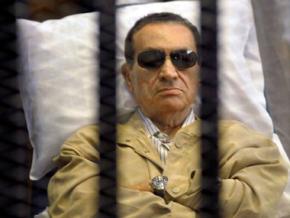Will Mubarak go free?
shines a spotlight on the twisted logic of Egypt's military dictators.
HOSNI MUBARAK may be a free man by the end of the week. On August 19, a court dismissed one of the few remaining corruption charges against him. Though Mubarak is still supposed to stand trial for the killing of protesters during the 2011 uprising that led to his ouster, his lawyer successfully argued that Mubarak has reached the limit for pre-trial detention.
"All we have left is a simple administrative procedure that should take no more than 48 hours," Fareed el-Deeb, Mubarak's lawyer, said on Monday. "He should be freed by the end of the week."
"He who controls the past controls the future," wrote George Orwell. "He who controls the present controls the past." The struggle over Egypt's past and its future may soon take a turn that would have seemed unthinkable a few weeks ago.
Scarcely anyone had speculated that Mubarak might walk free, at least at this point in time, but his possible imminent release is just one of several signs in recent days of the dramatic shift in the confidence and assertiveness of Egypt's military leaders--and the appointed interim government that gives the military an aura of civilian legitimacy.

The same day that a court cleared the way for Mubarak's release, security forces arrested Mohamed Badie, the spiritual leader of the Muslim Brotherhood. He was charged with inciting the murder of protesters during clashes outside the Muslim Brotherhood's Cairo headquarters on June 28, two days before the massive June 30 day of demonstrations that brought millions of Egyptians into the streets to oppose the rule of the Brotherhood's President Mohamed Morsi.
On July 3, the military ousted Morsi and announced that it would appoint an interim president. It has since used savage force to suppress protests by Brotherhood members and supporters, killing hundreds and wounding many more.
This raises a stunning prospect--that when Badie's trial begins on August 25 over the killing of eight protesters outside the Brotherhood's headquarters six weeks ago, Mubarak, the tormenter of an entire generation of Egyptians, could be relaxing with his family on a seaside beach, enjoying luxuries purchased with the tens of millions of dollars embezzled during his decades in power.
MEANWHILE, MOHAMED ElBaradei, the former vice president, must appear in a misdemeanor court on September 19. ElBaradei--a founder of the National Salvation Front that opposed the Muslim Brotherhood government under Morsi--resigned in protest from his position August 14 after the military's bloody crackdown on Brotherhood's protest camps in al-Nahda Square and Rabaa al-Adwiyya.
What is ElBaradei charged with? Incredibly, he is accused of breaches of "national trust"--because, according to Sayed Ateeq, head of the Criminal Law Department at Helwan University's Faculty of Law, he "had not presented to the government, the presidency or the revolutionary forces any other alternatives to dispersing the sit-ins, as well as disregarded the 'terrorist crimes' committed by the Muslim Brotherhood there."
But the military rulers' pretzel logic--excusing those who commit crimes while accusing those who haven't--doesn't end there. According to the New York Times:
The police scarcely bothered to offer a credible explanation for the deaths of three dozen Morsi supporters in custody over the weekend. After repeatedly shifting stories, they ultimately said the detainees had suffocated from tear gas during a failed escape attempt. But photographs taken at the morgue on Monday showed that at least two had been badly burned from the shoulders up and that others bore evidence of torture.
Not to be outdone in their hypocrisy, the Obama administration and Pentagon officials have, despite the violence and chaos in Egypt, reiterated their commitment to maintaining a close relationship with Egypt's military. So while the Obama administration canceled joint military exercises with Egypt last month, in supposed protest of Morsi's ouster, the more important business of maintaining Egypt's air force didn't waver--with the U.S. Air Force awarding a contract to General Electric to upgrade Egyptian fighter jets, just as the military stepped in to crush the Brotherhood's protest camps.
[A]s the engine contract demonstrates, the Pentagon apparently views these measures as mere speed bumps for an ongoing relationship that'll one day get back to normal--just as soon as the Egyptian military stops squelching its Islamist dissenters.
Amid the unrest, the Pentagon has been moving forward with business deals under the assumption there will be no long-term suspension in military-to-military relations. [Secretary of Defense Chuck] Hagel went so far as to declare in a previous statement: "The Department of Defense will continue to maintain a military relationship with Egypt."


